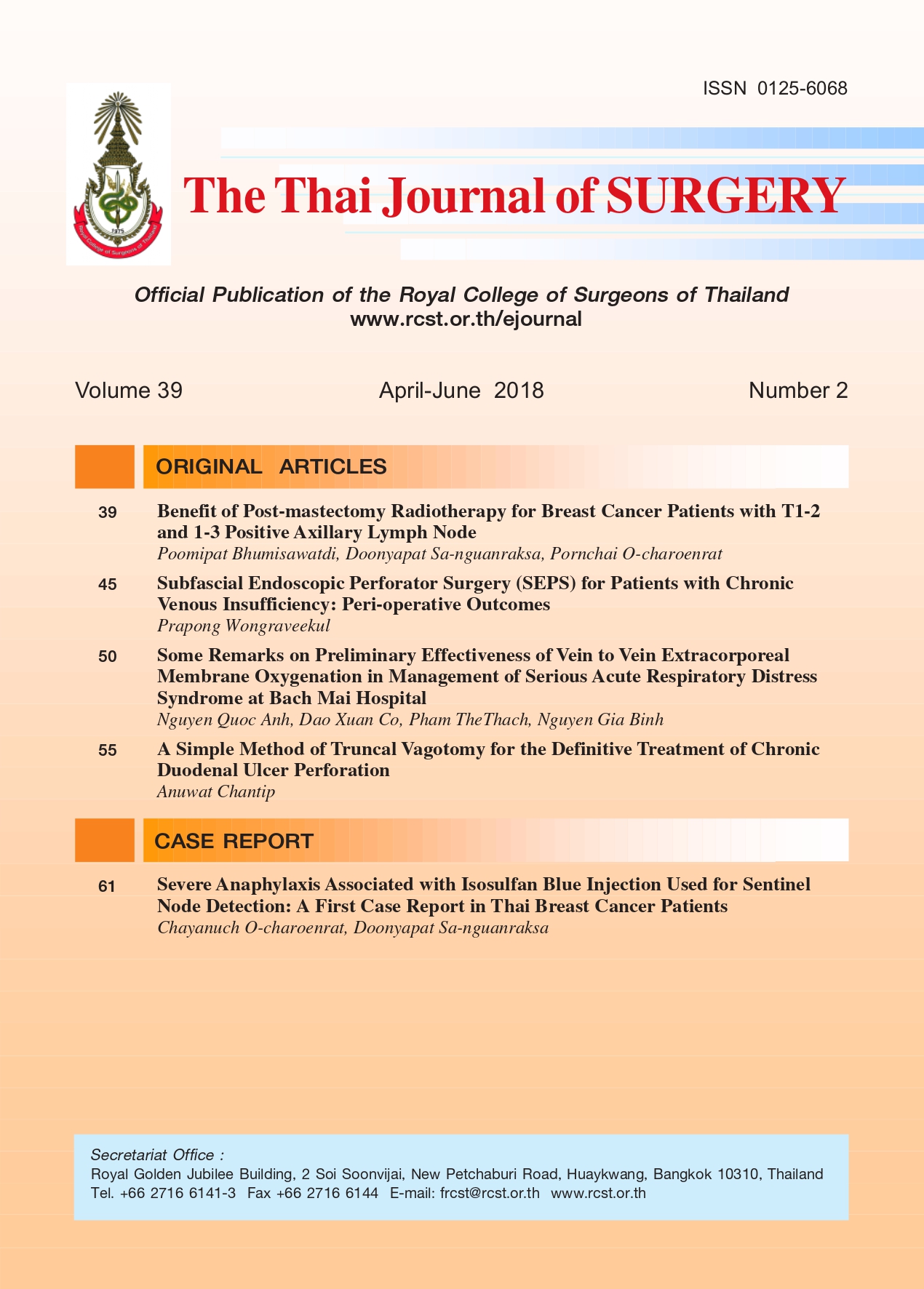Some Remarks on Preliminary Effectiveness of Vein to Vein Extracorporeal Membrane Oxygenation in Management of Serious Acute Respiratory Distress Syndrome at Bach Mai Hospital
Keywords:
ECMO, ARDS, managememt of patients with severe ARDSAbstract
Purpose: Until now ARDS (Acute Respiratory Distress Syndrome) mortality rate remained as high at 40 to 60%. If applicable ECMO for cases that do not meet ventilation achieving, survival rates was improved from 50 to 70%. We evaluate the technical efficiency ECMO venous-venous (ECMO V-V) in the treatment of patients with severe ARDS.
Materials and Methods: Fifteen patients with ARDS without chronic disease, serious bleeding supported with ECMO venous - venous with ECA PaO2 / FiO2 <80, at the Intensive Care Unit Bach Mai Hospital enrolled.
Results: The mean age 45.7 ± 15.7 years (youngest 18, oldest 70), male / female = 8/7. APACHE II and SOFA Score: 16.2 ± 5.0 and 7.7 ± 3.4. ARDS may cause 4/15 (26.6%), bacterial, 2 cases of TB, viral 2/15, 11/15 (73.3%) do not see the root microorganisms. Ratio PaO2 / FiO2 before ECMO 58.4 ± 12.8 (37-78), while 10.2 ± 6.1 ECMO support (4-28 days). ECMO successful withdrawal rate 11/15 (73.3%), the survival rate 10/15 (66.7%), deaths 5/10 (33.3%). Some complications: bleeding catheter site 5/15 (33.3%) and wound infections 3/15 (20%) are the most common. 10.2 ± 6.1 time day ECMO.
Conclusions: ECMO V - V initially showed to be effective in treating severe ARDS. More research needs to be grounded on application as well.
References
2. Eachempati SR, Hydo LJ, Shou J, Barie PS. Outcomes of acute respiratory distress syndrome (ARDS) in elderly patients. J Trauma 2007;63:344-50.
3. Estenssoro E, Dubin A, Laffaire E, et al. Incidence, clinical course, and outcome in 217 patients with acute respiratory distress syndrome. Crit Care Med 2002;30:2450.
4. Davies A, Jones D, Bailey M, et al. Extracorporeal membrane oxygenation for 2009 Influenza A(H1N1) acute respiratory distress syndrome. JAMA 2009;302:1888-95.
5. George WY Ng, Leung AKH, Sin SY, et al. Three-year experience of using venovenous extracorporeal membrane oxygenation for patients with severe respiratory failure. Hong Kong Med J 2014;20:407-12.
6. Hemmila MR, Rowe SA, Boules TN, et al. Extracorporeal life support for severe acute respiratory distress syndrome in adults. Ann Surg 2004;240:595.
7. Ullrich R, Lorber C, Röder G, et al. Controlled airway pressure therapy, nitric oxide inhalation, prone position, and extracorporeal membrane oxygenation (ECMO) as components of an integrated approach to ARDS. Anesthesiology 1999;91:1577.
8. Brogan TV, Thiagarajan RR, Rycus PT, et al. Extracorporeal membrane oxygenation in adults with severe respiratory failure: a multi-center database. Intensive Care Med 1999;35:2105.
9. Lec Nhun, Vu Van Dinh, Nguyen Dat Anh. Evaluating the effectiveness of artifficial ventilation by lung expansioné technique in treatment of respiratory distress progression. Practical Medicine Journal 2011;9:98-102.
10. Zangrillo A, Biondi-Zoccai G, Landoni G, et al. Extracorporeal membrane oxygenation (ECMO) in patients with H1N1 influenza infection: a systematic review and meta-analysis including 8 studies and 266 patients receiving ECMO. Crit Care 2013; 13;17.
11. Moore SA, Diet CA, Coleman DM .Extracorporeal life support during pregnancy. J Thorac Cardiovasc Surg 2016;151.
12. Cheng R, Hachamovitch R, Kittleson M, et al. Complications of extracorporeal membrane oxygenation for treatment of cardiogenic shock and cardiac arrest: a meta-analysis of 1,866 adult patients. Ann Thorac Surg 2014;97:610-6.
Downloads
Published
How to Cite
Issue
Section
License
Articles must be contributed solely to The Thai Journal of Surgery and when published become the property of the Royal College of Surgeons of Thailand. The Royal College of Surgeons of Thailand reserves copyright on all published materials and such materials may not be reproduced in any form without the written permission.



